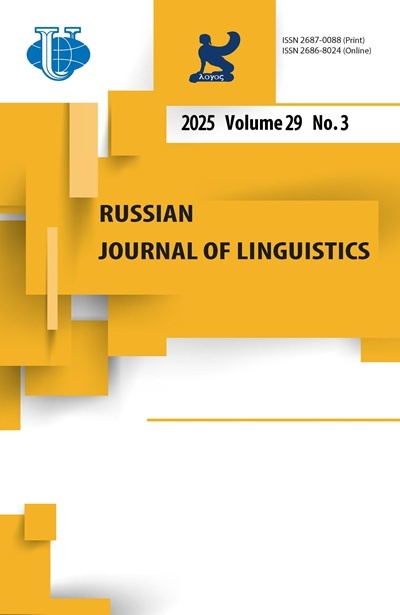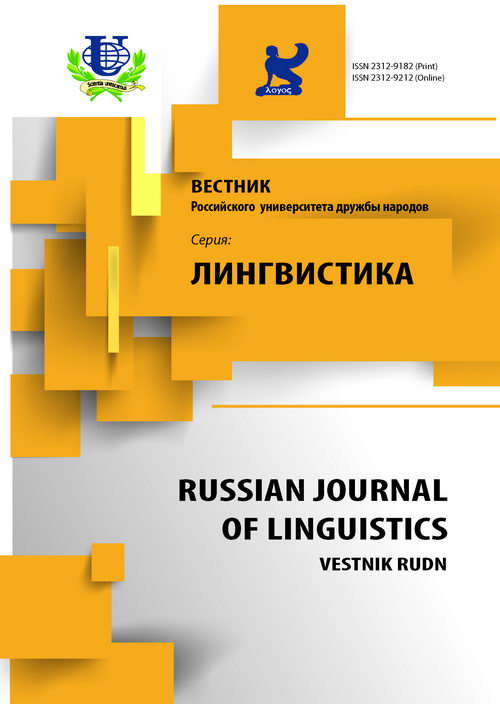Обучение переводчиков для работы в условиях культурного многообразия мира. Межкультурная компетенция переводчиков и перевод как эмотивный вид деятельности
- Авторы: Коскинен К.1
-
Учреждения:
- Университет Восточной Финляндии
- Выпуск: Том 19, № 4 (2015)
- Страницы: 175-184
- Раздел: Статьи
- URL: https://journals.rudn.ru/linguistics/article/view/9266
- ID: 9266
Цитировать
Полный текст
Аннотация
Статья рассматривает перевод как одну из форм межкультурной языковой деятельности в свете обсуждаемого в последнее время феномена культурного многообразия мира, то есть возросшей лингвистической, этнической и культурной мозаичности (гибридности) нашего общества. Культурное многообразие мира заставляет нас признать эмотивную природу переводческой деятельности, таким образом, подчеркивая роль эмпатии. Автор утверждает, что многие традиционные концепции переводоведения требуют пересмотра для того, чтобы оставаться актуальными в рамках культурного многообразия мира. Таким образом, критическая переоценка основополагающих культурных концепций внесет вклад как в методику преподавания перевода, так и в исследования в области переводоведения.
Об авторах
Каиса Коскинен
Университет Восточной Финляндии
Email: kaisa.koskinen@uef.fi
Кафедра переводоведения
Список литературы
- Blommaert, Jan 2010. The socioliguistics of globalization. Cambridge: Cambridge University Press.
- Blommaert, Jan 2013. Ethnography, superdiversity and linguistic landscapes. Chronicles of complexity. Bristol: Multilingual Matters.
- Blommaert, Jan & Ben Rampton 2011. Language and superdiversity. Diversities 13/2, 1-22. www.unesco.org/shs/diversities/vol13/issue2/art1 [accessed 2.10.2015].
- Byram, Michael 1997. Teaching and Assessing Intercultural Competence. Clevedon U.K.: Multilingual Matters.
- Coplan, Amy & Peter Goldie (eds.) 2011. Empathy. Philosophical and Psychological Perspectives. Oxford: Oxford University Press.
- Hokkanen, Sari (in press). To Serve and to Experience: An Autoethnographic Study of Simultaneous Church Interpreting. Doctoral dissertation, University of Tampere.
- Katan, David 2009. Translator Training and Intercultural Competence. In Stefania CAvagnoli, Elena Di Giovanni, Raffaela Merlini (eds), La ricerca nella communicazione interlinguistica. Modelli teorici e metodologici. Milan: Franco Angeli, 282-301.
- Kenny, Dorothy 2011. The Ethics of Machine Translation. In Sybille Ferner (ed.) Reflections on Language and Technology: the driving forces in the modern world of translation and interpreting. NZSTI.
- Koskinen, Kaisa 2000. Beyond Ambivalence. Postmodernity and the Ethics of Translation (PhD). Acta universitatis Tamperensis 773, Tampere: University of Tampere. http://urn.fi/urn:isbn:951-44-4941-X [accessed 2.10.2015].
- Messelink, Annelies & Jan D. ten Thije 2012. Unity in Super-diversity: European capacity and intercultural inquisitiveness of the Erasmus generation 2.0. Dutch Journal of Applied Linguistics 01/2012; 1(1). doi: 10.1075/dujal.1.1.07mes [accessed 25.9.2015].
- PICT 2012. Intercultural competence in EU postgraduate translation programmes. Situational survey for the project Promoting intercultural competence in translators. Available at: http://www.pictllp.eu/download/PICT_SURVEY_REPORT.pdf [accessed 25.9.2015].
- Piller, Ingrid 2011. Intercultural Communication. A Critical Introduction. Edinburgh: Edinburgh University Press.
- Pym, Anthony 2000. On method in Hispanic translation history. Paper presented to the V jornadas internationales de historia de la traducción. Universidad de Leòn. 29-30 May, 2000. Available at: http://usuaris.tinet.cat/apym/on-line/intercultures/methodleon.html [accessed 2.10.2015].
- Pym, Anthony 2011. On Translator Ethics. Trans. Heike Walker, revised by the author. Amsterdam/Philadelphia. John Benjamins Publishing Company.
- Schleiermacher, Friedrich 1813/1977. On the Different Methods of Translating. Trans. André Lefevere, in André Lefevere, Translating Literature: The German Tradition from Luther to Rosenzweig. Assen & Amsterdam: Van Grocum, 67-89.
- Suojanen, Tytti, Kaisa Koskinen and Tiina Tuominen 2015. User-Centered Translation. London & New York: Routledge.
- Toury, Gideon 2012. Descriptive translation studies - and beyond. Revised edition (ed. Andrew Chesterman). Amsterdam and Philadelphia: John Benjamins Publishing Company.
- Venuti, Lawrence 1995. The Translator’s Invisibility. A history of translation. London and New York: Routledge.
- Vermeer, Hans J. 1996. A skopos-theory of translation: Some arguments for and against. Heidelberg: TEXTconTEXT.
- Vertovec, Steven 2006. The Emergence of Super-Diversity in Britain. Centre on Migration, Policy and Society. Working Paper No. 25. University of Oxford.
- Vertovec, Steven 2007. Super-diversity and its implications. Ethnic and Racial Studies 30, 1024-1054.
- Wimmer Andreas & Nina Glick Schiller 2002. Methodological Nationalism and beyond: nation-state building, migration, and the social sciences. Global Networks 2 (4), 301-334.
Дополнительные файлы















